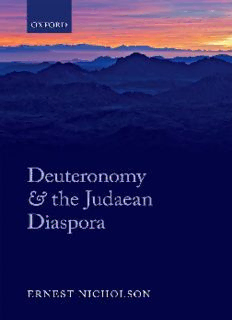
Deuteronomy and the Judaean diaspora PDF
Preview Deuteronomy and the Judaean diaspora
DEUTERONOMY AND THE JUDAEAN DIASPORA This page intentionally left blank Deuteronomy and the Judaean Diaspora ERNEST NICHOLSON 1 3 Great Clarendon Street, Oxford OX2 6DP, United Kingdom Oxford University Press is a department of the University of Oxford. It furthers the University’s objective of excellence in research, scholarship, and education by publishing worldwide. Oxford is a registered trade mark of Oxford University Press in the UK and in certain other countries. © Ernest Nicholson 2014 Several articles are reproduced here in revised form by permission of their original publishers. For copyright information please consult the Publisher’s Acknowledgements in the prelims. The moral rights of the author have been asserted First published 2014 Impression: 1 All rights reserved. No part of this publication may be reproduced, stored in a retrieval system, or transmitted, in any form or by any means, without the prior permission in writing of Oxford University Press, or as expressly permitted by law, by licence or under terms agreed with the appropriate reprographics rights organization. Enquiries concerning reproduction outside the scope of the above should be sent to the Rights Department, Oxford University Press, at the address above You must not circulate this work in any other form and you must impose this same condition on any acquirer British Library Cataloguing in Publication Data Data available Library of Congress Control Number: 2013943246 ISBN 978–0–19–870273–3 As printed and bound by CPI Group (UK) Ltd, Croydon, CR0 4YY In memory of Peter Filius Carissimus This page intentionally left blank Preface This book has gone through several stages in the making. With the exception of the Introduction, the chapters in Part I began as articles published in Zeitschrift für die alttestamentliche Wissenschaft and in other collections of learned essays, which I list in the bibliography. Observations and constructive comments from colleagues, including notice of recent publications, have all called for an ongoing rethink- ing, revision, and in varying degrees expansion of some of these earlier essays, whilst at the same time signalling a need to fill out and shore up others in the interest of greater clarity. Part II, which focuses upon the nature of the so-called Deuteronomistic History, contains a reprint of my contribution to the Festschrift honouring Professor James Barr on the occasion of his seventieth birthday in 1994. I have included here it for convenient reference for readers, since it is immediately followed by a response to a lengthy critique of it by John Van Seters. I am indebted to all those colleagues, both here in the UK and abroad, who have taken the time to respond so helpfully to my enquiries about some technical issues, and for their generous interest in the progress of this book. I should add that its conclusions, and with this any shortcomings, are attributable solely to myself. I am grateful also to Tom Perridge at Oxford University Press for his advice and help on various matters in the course of the publication of the book, and to Elizabeth Robottom for her very helpful assistance in the final stages of preparation for publication. I owe a special debt of gratitude to John Barton, my colleague here in Oxford, and to Andrew Mayes at Trinity College Dublin, who have read with great patience various drafts of the chapters of the book, and for their encouragement throughout. I owe them more than I can express. Ernest Nicholson Oriel College Oxford This page intentionally left blank Contents Abbreviations x Publisher’s Acknowledgements xii Part I 1. Introduction 3 2. Josiah and the Priests of the High Places (2 Kings 23: 8a, 9) 16 3. Deuteronomy and the Babylonian Diaspora 41 4. Deuteronomy, the Prophets, and Scripture 74 5. The ‘Law’ of the King in Deuteronomy 17: 14–20 101 6. ‘Do not dare to set a foreigner over you’: The King in Deuteronomy and ‘The Great King’ 117 Part II 7. Story and History in the Old Testament 137 8. The Deuteronomistic Corpus: History or Story? AResponse to John Van Seters 152 Bibliography 178 Index of Authors 189 Index of Sources 191
Description: